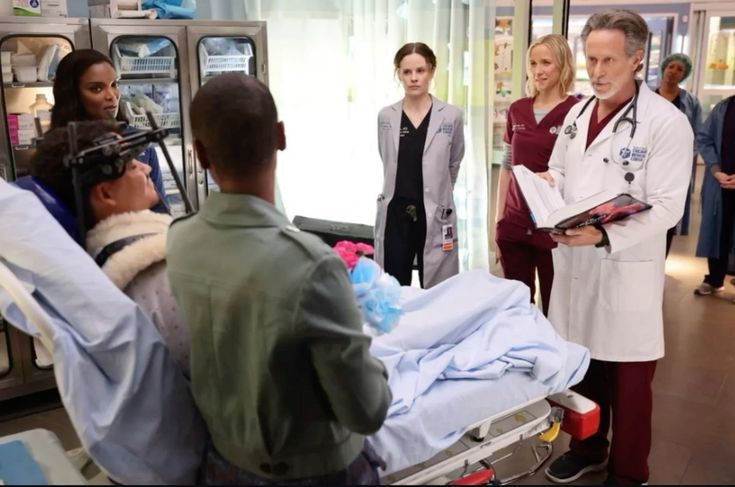
As one of the most beloved medical dramas on television, Chicago Med has long captivated viewers with its thrilling hospital storylines, complex characters, and gripping medical cases. However, there’s one particular plotline that has many fans questioning the show’s direction: Lenox’s romance. The recent introduction of this romantic subplot not only feels forced but also continues a trend of unwanted love stories that detract from the medical drama’s true essence.
This article takes a closer look at how Lenox’s romance is a symptom of a larger issue in Chicago Med—the overuse of unnecessary and distracting romantic storylines. Let’s dive into why this romance is not only unwelcome but also threatens to undermine the show’s credibility and storytelling.

The Growing Problem of Forced Romance in Medical Dramas
Romance Subplots: A Double-Edged Sword
Romance in medical dramas isn’t inherently problematic. In fact, well-crafted love stories can humanize characters, provide emotional depth, and even serve as a source of tension in an otherwise fast-paced environment. However, the issue arises when the romance feels shoehorned into the narrative, as if the writers are simply ticking off a checklist rather than developing a genuine storyline.
In recent seasons, Chicago Med has increasingly relied on romantic subplots to keep viewers engaged. But at what cost? Instead of focusing on the intense medical cases or deepening character development, the show seems to prioritize personal drama. This shift has begun to alienate loyal fans who tuned in for the medical content rather than melodrama.
Lenox’s Romance: A Symptom of a Bigger Issue
Who Is Lenox, and Why Does Her Romance Matter?
For those who may not be familiar, Lenox is a relatively new character on Chicago Med. As a young and ambitious professional, she quickly gained attention for her sharp medical skills and potential. However, it wasn’t long before her romantic involvement became a focal point of her storyline, overshadowing her contributions to the hospital and her growth as a medical professional.
This romantic subplot does nothing to enhance Lenox’s character. Instead, it reduces her to a stereotype—the “love interest”—which diminishes the complexity that viewers were initially drawn to. Instead of watching Lenox tackle challenging medical cases or navigate the high-stakes world of the emergency room, we’re left with predictable relationship drama.
The Overuse of Romance: A Trend That Needs to Stop
While Chicago Med isn’t the only show guilty of overemphasizing romance in a professional setting, Lenox’s storyline serves as a glaring example of how this trend has gone too far. Time and time again, we see characters like Lenox—strong, competent, and driven individuals—being reduced to their romantic entanglements rather than their professional achievements.
This type of storytelling is not only frustrating but also sends a negative message to audiences. It suggests that a woman’s worth, even in a high-stress, high-skill profession like medicine, is linked more to her romantic life than her career accomplishments. This harmful trope is something we need to leave behind, not perpetuate.
Why Lenox’s Romance Is a Distraction, Not an Asset

Romantic Drama vs. Medical Drama: Why They Don’t Mix
One of the primary reasons the romance plotline feels out of place in Chicago Med is that it detracts from the medical drama that should be at the center of the show. Viewers tune in for the intense, fast-paced medical cases and the drama that unfolds within the hospital walls—not for the predictable back-and-forth of a workplace romance.
In Lenox’s case, her romantic involvement does nothing to advance the plot. Instead, it diverts attention away from the real stakes—lives are on the line in the emergency room, and yet the show chooses to focus on relationship drama that adds little to the narrative.
Does the Romance Add to Lenox’s Character?
Rather than making Lenox a more interesting or multi-dimensional character, the romance plotline feels like an afterthought, something added to satisfy a storyline quota. In reality, her development as a professional could be far more engaging and impactful if the writers focused on her growth in the medical field, her interpersonal skills with patients, or the ethical dilemmas she faces daily.
How This Trend Affects the Entire Show
Impact on the Overall Narrative
When Chicago Med focuses too heavily on romantic subplots, it takes away from the show’s ability to explore complex medical issues. Viewers come to Chicago Med for heart-pounding medical drama, and the more the show shifts its focus to romantic relationships, the more it risks losing its identity as a compelling medical series.
As fans, we want the characters to be tested by their work, not their personal lives. Romantic relationships, while relatable, should never overshadow the stakes that come with working in an ER. The unbalanced focus on romance, especially with Lenox, creates a disconnect between the audience and the show’s true essence.
Why It’s Time to Put an End to the Unnecessary Romance in Chicago Med

Bring Back the Medical Drama Fans Love
To restore Chicago Med to its roots, it’s crucial that the show reconsiders its approach to romance. While it’s understandable that love stories can add drama and tension, they should not be the driving force of the narrative. The true drama lies in the medical challenges, ethical dilemmas, and human connections that are forged under the pressure of life-or-death situations.
Incorporating less romance and more intense medical cases would not only stay true to the show’s identity but also respect the intelligence and emotional investment of its audience. Fans of Chicago Med crave those moments when the characters make tough decisions in the ER—not when they are embroiled in relationship drama.
Lenox’s Romance and the Importance of Balanced Storytelling
Striking the Right Balance Between Personal and Professional
The key to great storytelling lies in balance. Characters should have personal lives, but those personal lives should not overshadow their professional development. Lenox, as a medical professional, should be defined by her actions in the hospital, not by who she’s dating. It’s time for Chicago Med to embrace more nuanced character arcs that showcase the complexities of the medical field and the emotional growth of its characters without relying on forced romance.
Conclusion: Time to End the Romance Trend on Chicago Med
In conclusion, Lenox’s romance on Chicago Med is part of a larger issue that needs to be addressed. Romance in medical dramas can work when done thoughtfully, but when it becomes the central focus of the show, it distracts from what truly matters. The medical cases, the ethical challenges, and the compelling character arcs are the heart and soul of Chicago Med. It’s time for the show to shift back to what made it great—cutting-edge medical drama and characters who are defined by their work, not their relationships.
